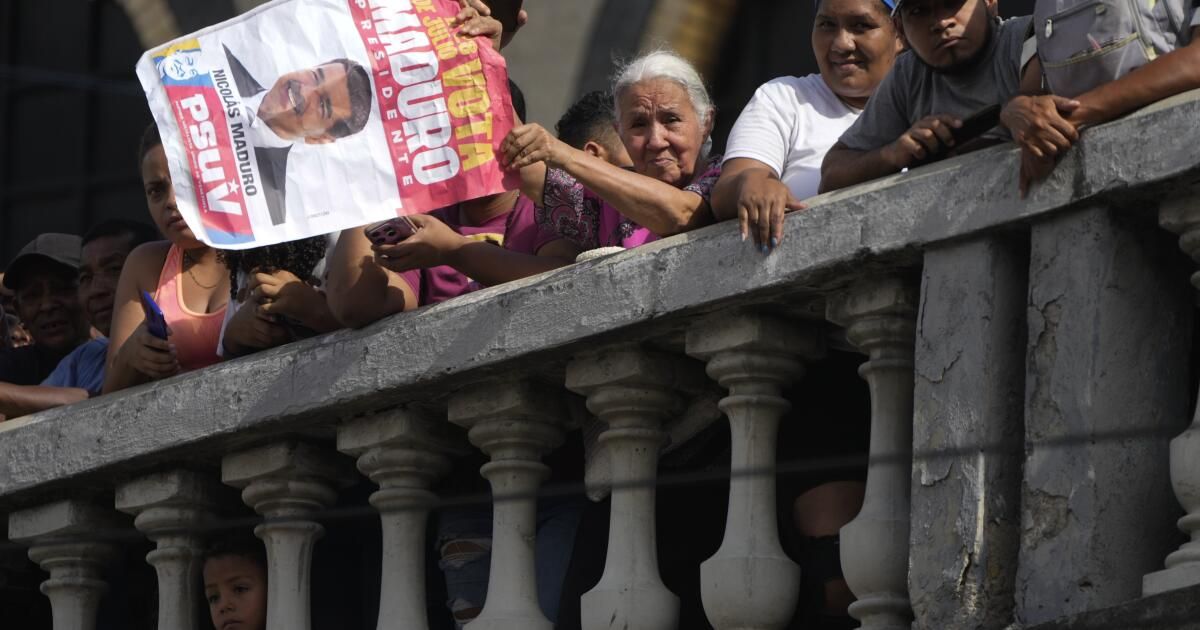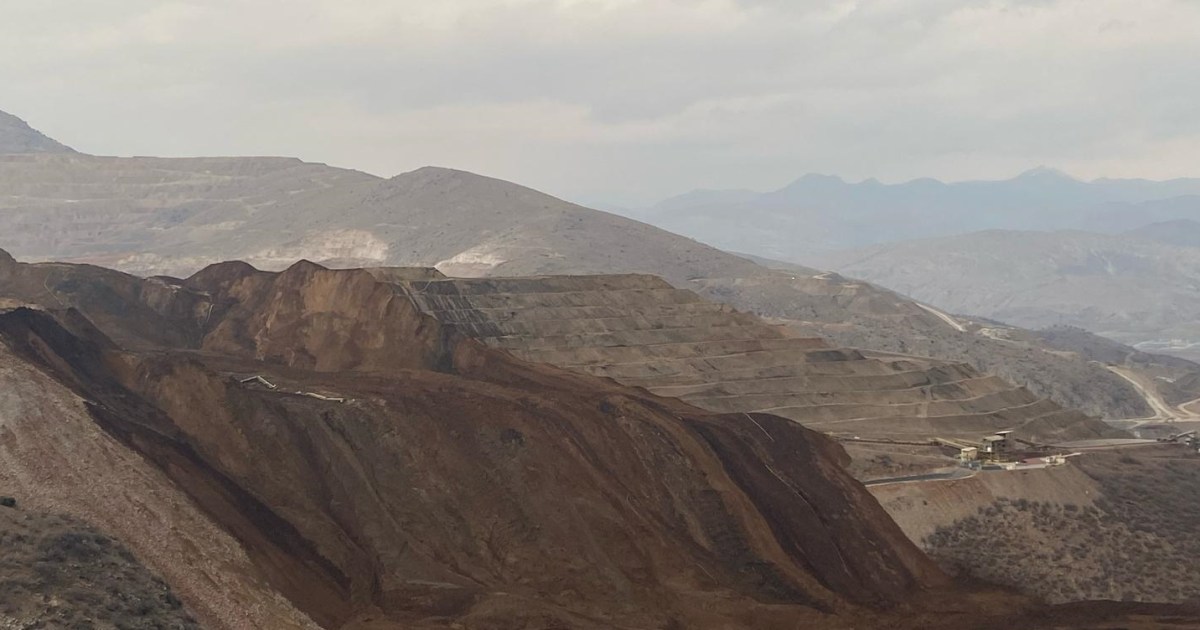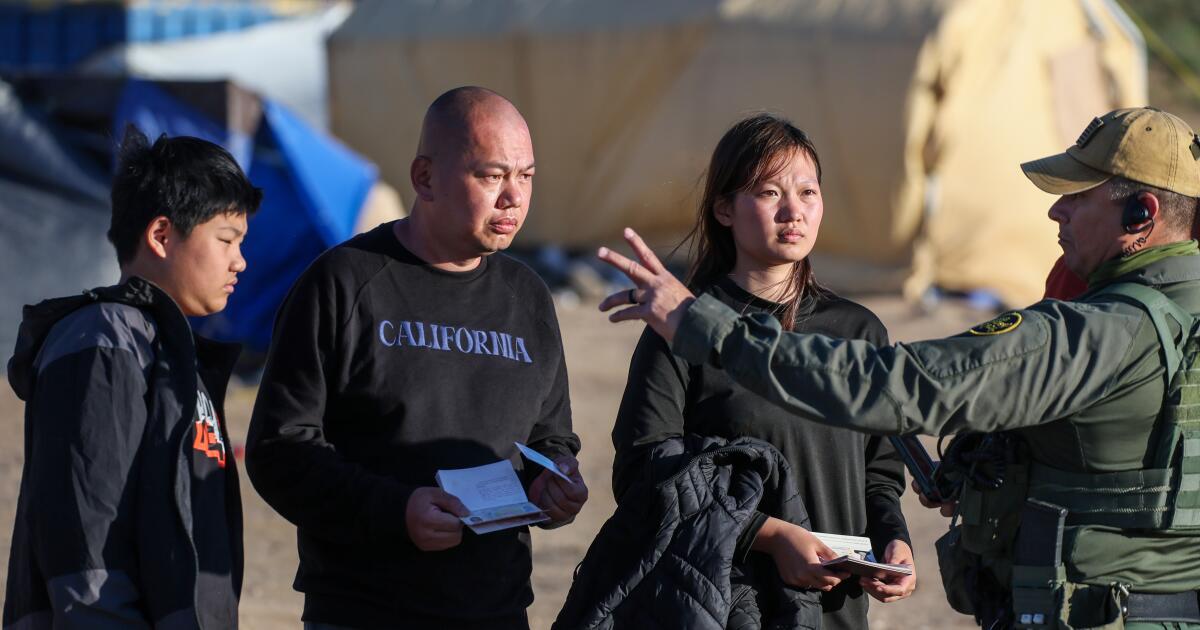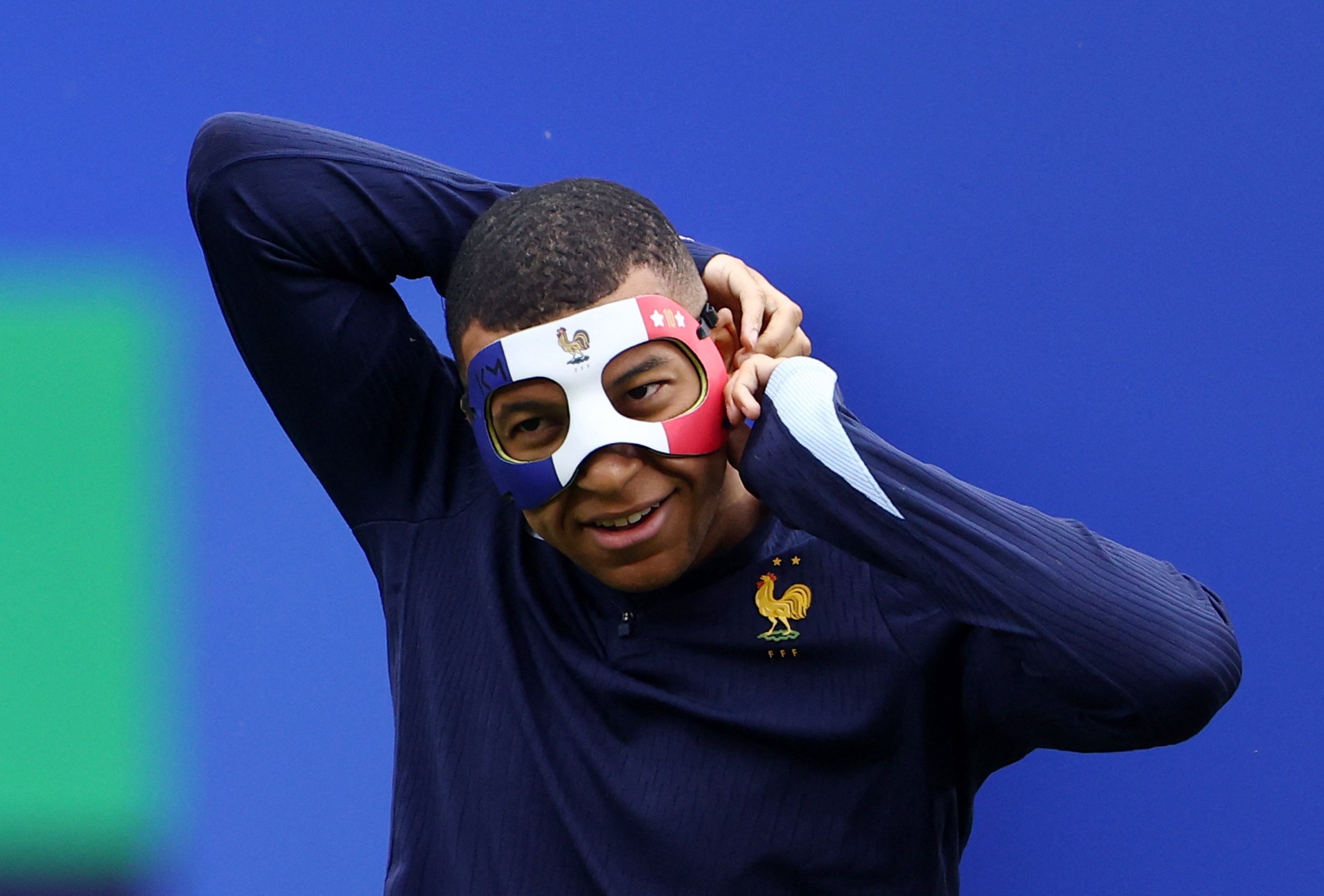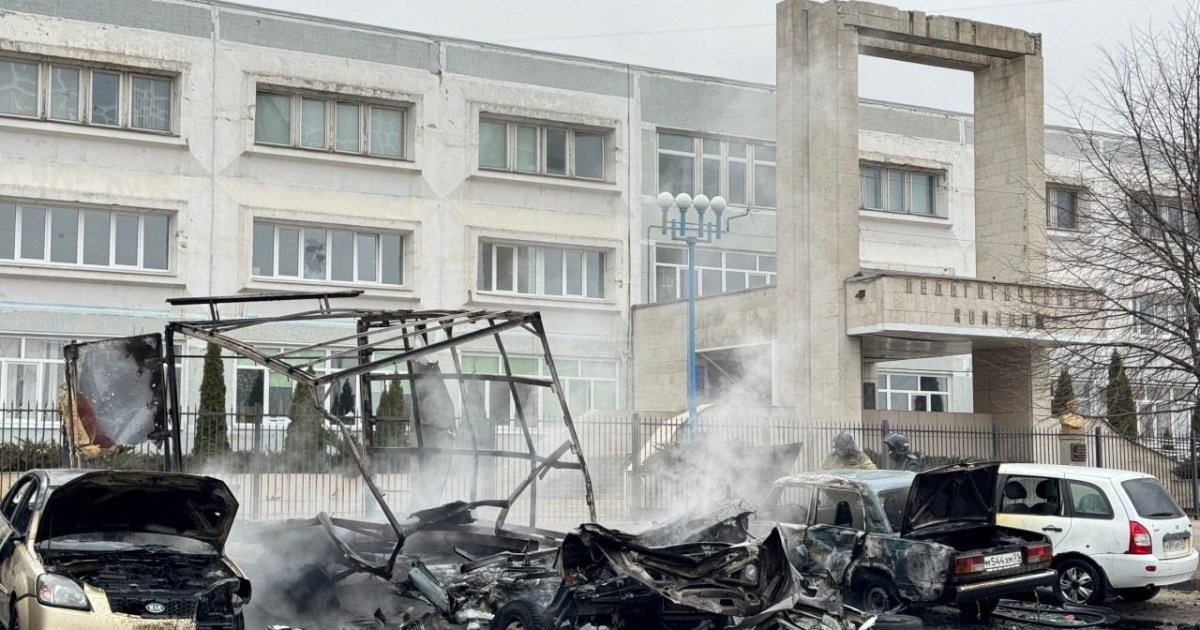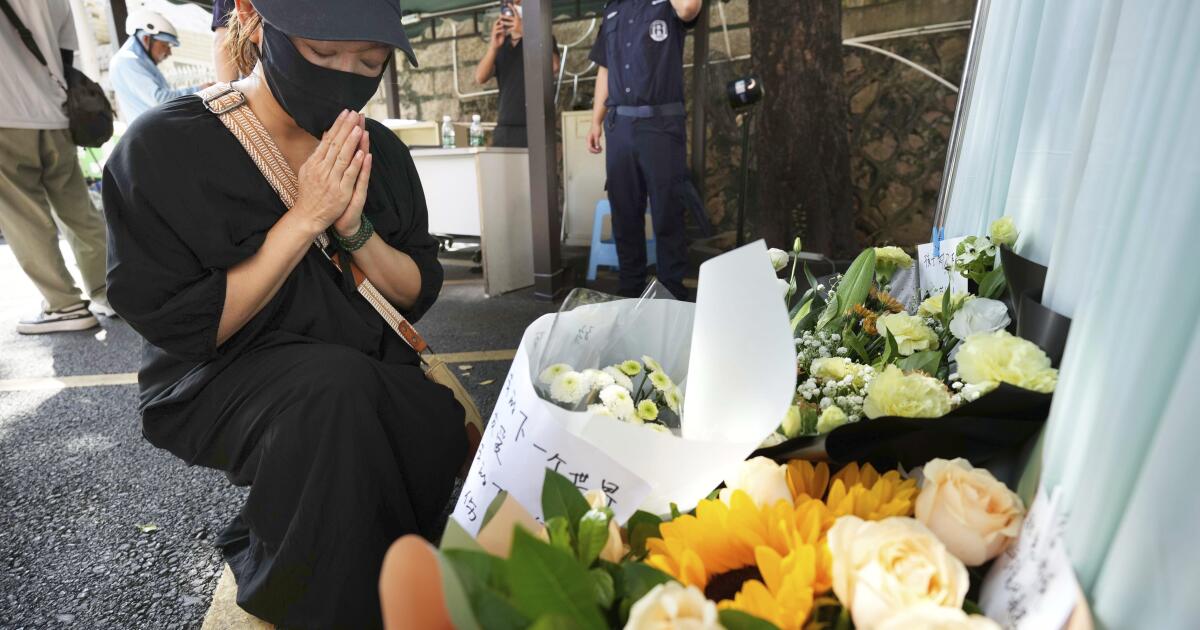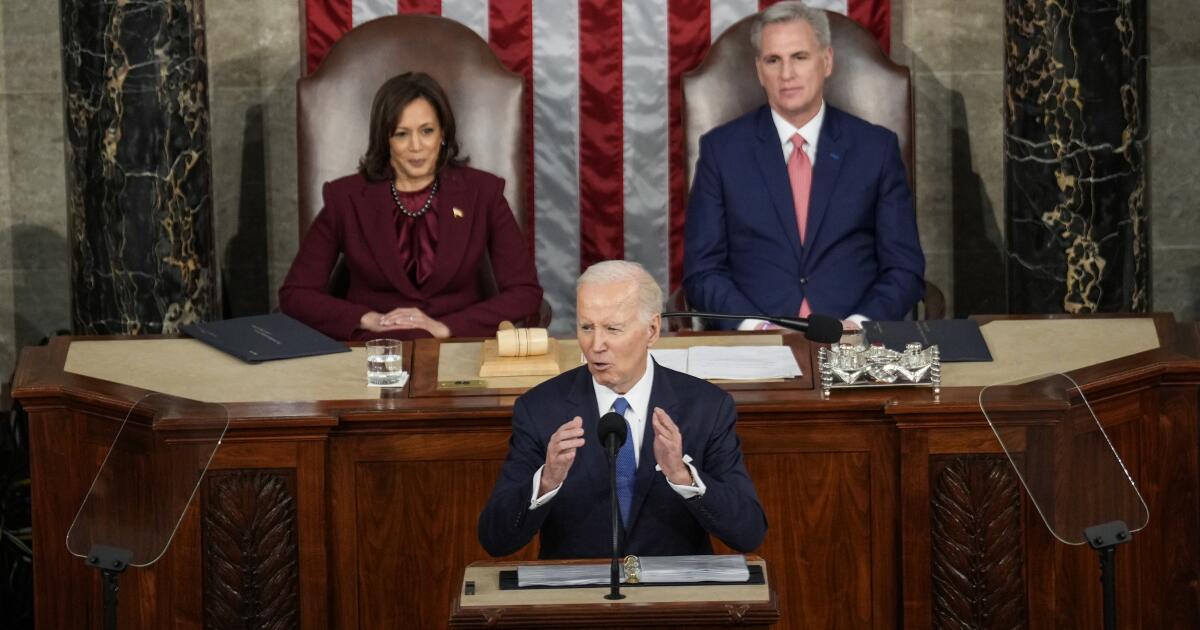Venezuela's authoritarian president is about to face his biggest test yet as uncertainty swirls around Sunday's election and what Nicolas Maduro, a longtime U.S. adversary, might do to stay in power.
Millions of Venezuelans will cast their ballots in what is widely seen as the country's most crucial election since Maduro took office 11 years ago following the death of his mentor, Hugo Chavez.
Maduro's government has already disqualified a rival who won opposition primaries, but the long-divided opposition has largely regrouped around another candidate, Edmundo González Urrutia, a former diplomat who holds a double-digit lead in polls.
Many are skeptical that Maduro will relinquish power and there is rife speculation about what the president would do if he loses.
“The degree of uncertainty surrounding this election is greater than any other election in Venezuela in the past 25 years,” said Geoff Ramsey, a senior fellow at the Atlantic Council, a Washington-based research group. “The fact is that even though the playing field is stacked against the opposition, there are reasons for optimism regarding the prospect of change.”
Venezuelan President Nicolas Maduro waves as he rides on the back of a military vehicle during the Independence Day parade in Caracas this month.
(Cristian Hernandez / Associated Press)
Here's what you need to know about Venezuela's election and why it matters to the United States:
What is behind the crisis in Venezuela?
Economic problems and political unrest have forced millions of Venezuelans to flee their homeland, and hundreds of thousands have arrived in the United States.
Venezuela, home to the world's largest oil reserves, was long one of Latin America's richest countries, although deep divisions between rich and poor were a source of instability.
After Chavez, a former military officer, was elected president in 1998, he embraced Cuba's Fidel Castro and later called President George W. Bush “the devil” during a speech at the United Nations.
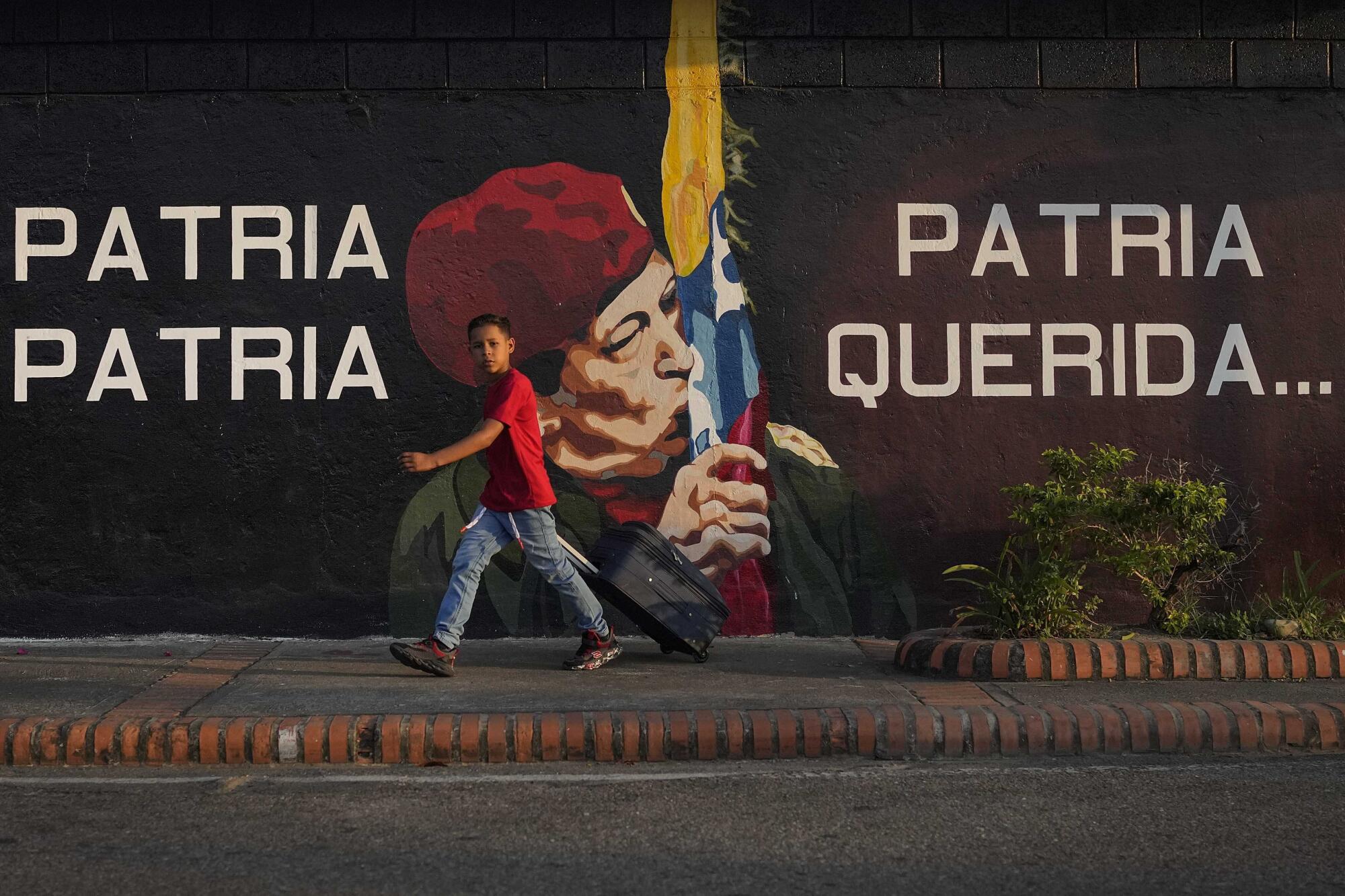
A mural of the late President Hugo Chavez in Sabaneta, Venezuela.
(Matias Delacroix / Associated Press)
Chavez's populist policies helped reduce poverty and inequality, but critics say his government neglected a crumbling oil infrastructure, scared away investors, sent the country deep into debt and steered Venezuela toward authoritarianism.
Falling oil prices under Maduro, his hand-picked successor, accelerated an economic collapse that has led to the exodus of more than seven million Venezuelans. Washington has largely blamed Maduro’s ineptitude, while Maduro blames U.S. sanctions targeting the oil industry and touts some improvement in economic performance in recent years.
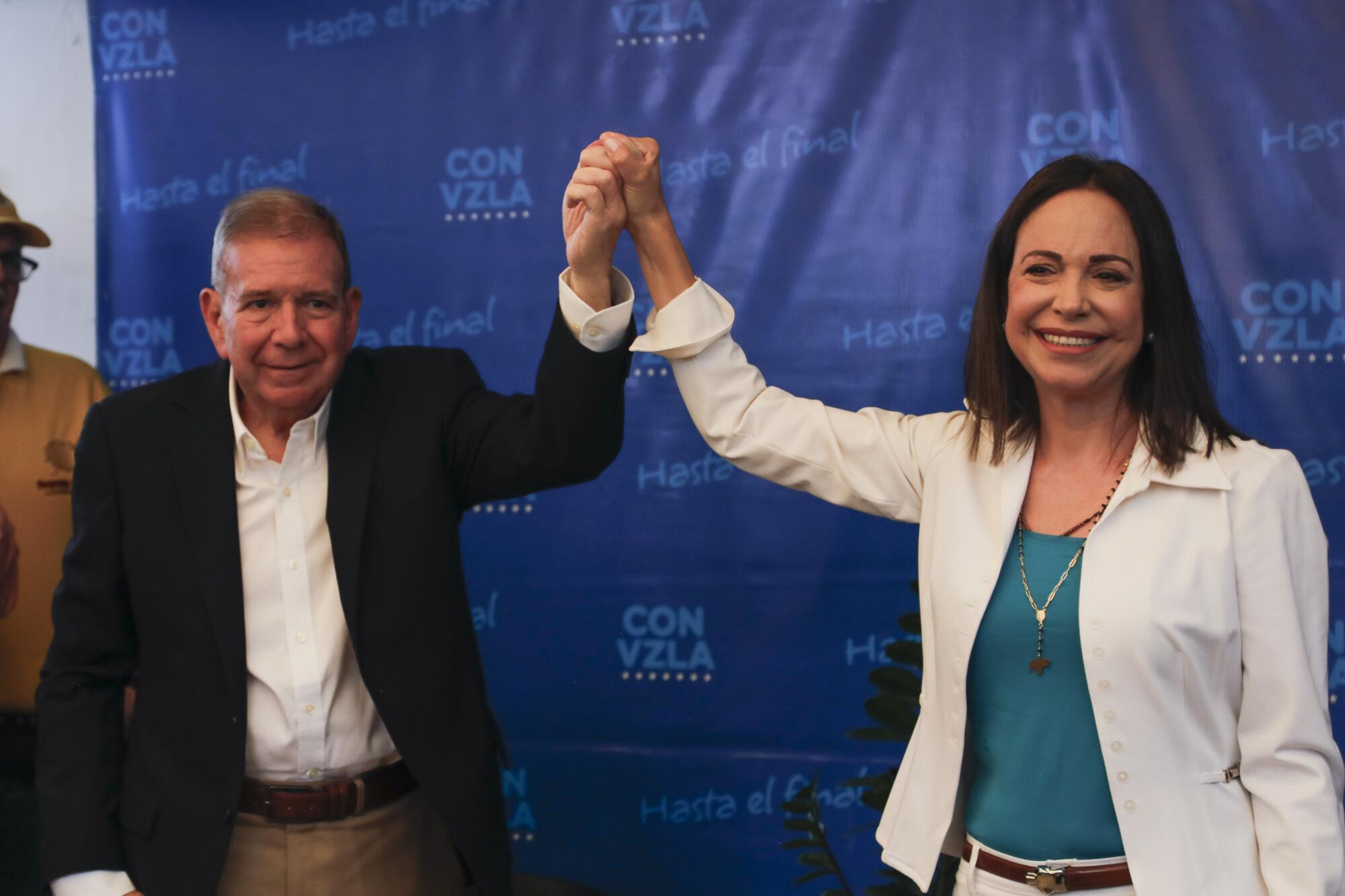
Venezuelan presidential candidate Edmundo González Urrutia stands with María Corina Machado, who was excluded from the presidential elections, at a press conference in Caracas this month.
(Cristian Hernandez / Associated Press)
Who is showing up and who is banned?
Maduro, 61, is seeking a third term as Chavez's ideological heir. Supporters say Maduro has continued Chavez's legacy of helping the poor while confronting U.S. “imperialism.”
Critics call Maduro a corrupt dictator who has rigged elections, jailed opponents and wrecked the economy. The International Criminal Court is investigating allegations of crimes against humanity by Maduro's security forces in their crackdown on protests in 2017.
Gonzalez, 74, is a former ambassador who emerged after the government disqualified former lawmaker Maria Corina Machado. Known as the “Iron Lady,” Machado won the opposition primary by a landslide but was barred from the presidential election because of what she has called “rigged judicial proceedings.” She now backs Gonzalez.
Gonzalez, who was little known before his presidential bid, is seen by his colleagues as a moderate consensus-builder who has promised a return to prosperity and democratic norms.
There are more candidates on the ballot, but they have little support. A simple majority of votes decides the winner, who will take office in January 2025 for a six-year term.
This time there will be no boycott
The opposition’s decision to run in this year’s elections — despite the slim chances that Maduro would win — represents a marked shift from the last election in 2018, which the United States and many other countries called a sham. The opposition largely boycotted those elections, a move encouraged by the Trump administration, which had hinted at a “military option” in Venezuela.
In 2019, amid massive opposition protests, the Trump White House recognized a Venezuelan lawmaker, Juan Guaidó, as the country’s “interim” president and declared Maduro’s leadership “illegitimate.” The Trump administration subsequently stepped up sanctions and accused Maduro and his top lieutenants of “narcoterrorism” and other charges. But Maduro cut diplomatic ties with Washington and remained in office. Guaidó eventually fled into exile in Florida.
“The opposition has learned from its mistake,” Ramsey said. “The solution to the Venezuelan crisis is not going to come from outside. It will be the result of complex negotiations and internal pressure.”
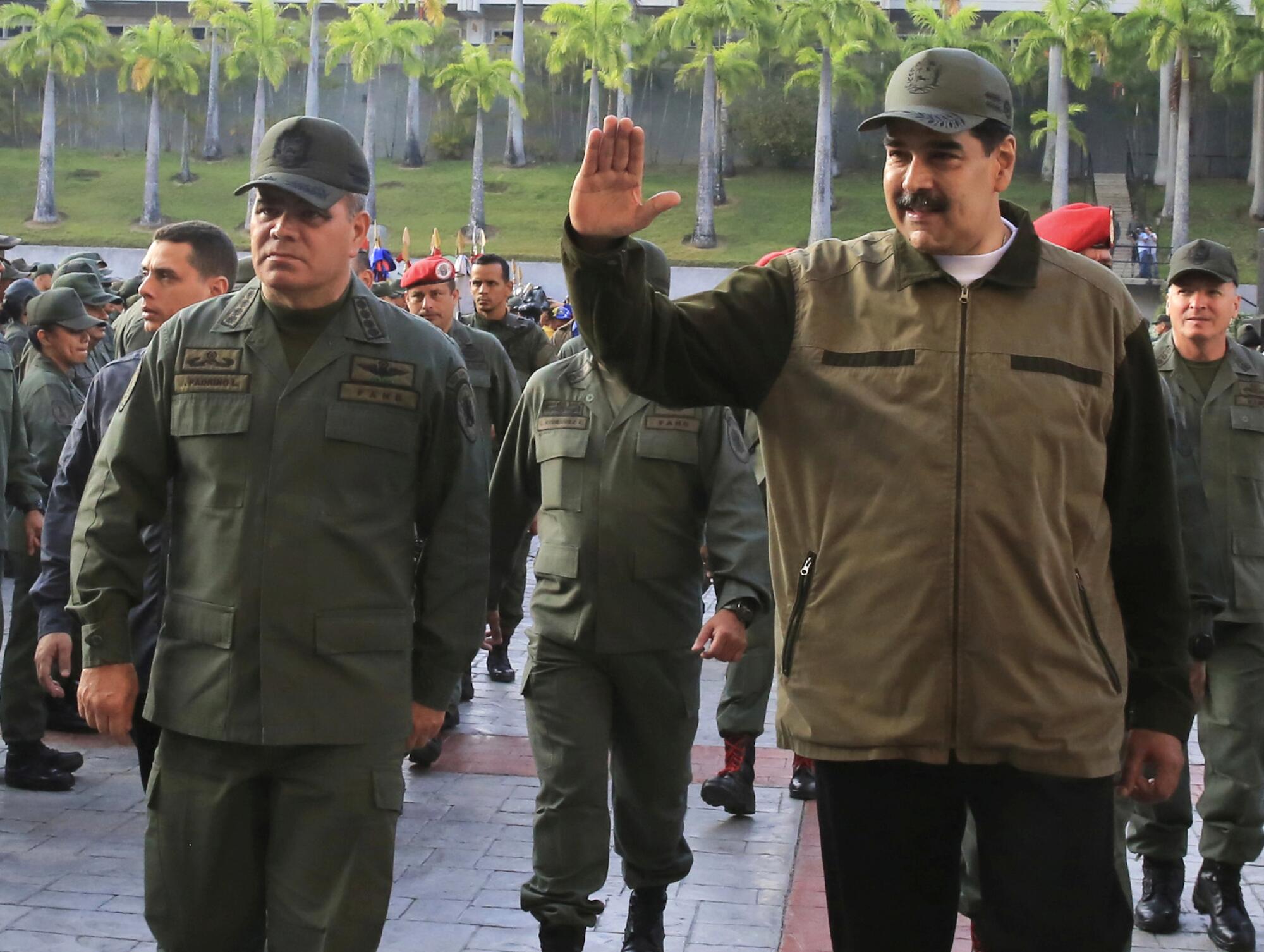
Maduro, accompanied by Defense Minister Vladimir Padrino, in Caracas in 2019.
(Jhonn Zerpa / Associated Press)
Already solved?
Analysts say that regardless of the outcome, Maduro will likely claim victory. But how far he will take that claim and who will back him are key questions. Regional leaders, including Brazilian President Luiz Inácio Lula da Silva, have called on Maduro to respect the election results.
The opposition has formed teams of observers to detect possible vote manipulation and other irregularities. The U.S.-based Carter Center and the United Nations plan to send a small number of observers. The Caracas government has blocked the arrival of a delegation from the European Union.
Maduro's legitimacy could be put to the test if opponents succeed in proving that the election was fraudulent. And evidence of widespread fraud could spark a new round of street protests.
“For those in power and for his government, it’s very important that Maduro demonstrate that he’s powerful enough to win an election and really mobilize support,” said Will Freeman, a fellow in Latin American studies at the Council on Foreign Relations.
Even if he wins fair and square, as unlikely as that may seem, experts say, Maduro will likely be forced to make concessions to an opposition that has gained new strength. His government is desperate for U.S. sanctions to be eased and for broader acceptance on the world stage.
An opposition victory — if recognized by electoral authorities, who are mostly loyal to Maduro — would pose its own challenges. A newly elected government would likely engage in talks with Maduro on how to achieve a peaceful transition. There is also uncertainty about the role that Machado — the former lawmaker credited with galvanizing the opposition — would play in a Gonzalez-led government.
And a key question is whether the Venezuelan military — long Maduro’s staunchest ally — would continue to back the president if election results clearly show he has been defeated.
“A lot of it will depend on the military, and it’s super opaque,” Freeman said.
Some question whether Maduro could rely on his security apparatus to quell any street protests after a false declaration of victory, whether the military would accept a new round of repression in light of international condemnation after crushing large-scale demonstrations in 2014 and 2017.
“Elites in the military and ruling party would likely exert silent pressure on Maduro, even when he declares victory, to demonstrate an openness to reforms and a willingness to signal an element of power-sharing with the opposition in his next term,” the Atlantic Council predicted in a report.
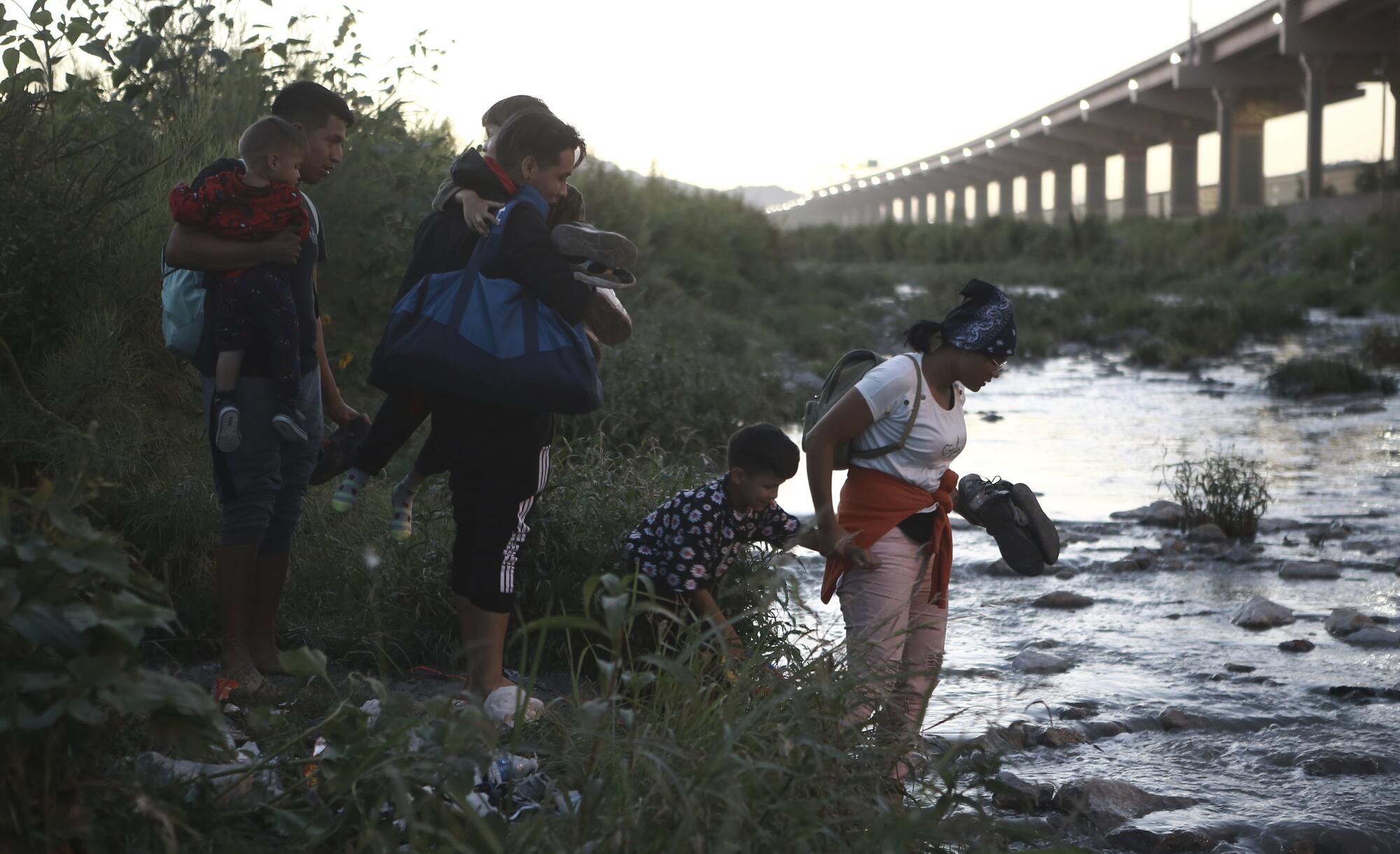
Venezuelan migrants prepare to cross the Rio Grande in Ciudad Juarez, Mexico, into the United States in 2022. Millions of Venezuelans have fled their homeland as economic and political turmoil engulfed the country.
(Christian Chavez/Associated Press)
Why the election is important for the United States
Geopolitics, immigration and oil are key issues in Venezuela.
Washington would like to bring the country — and its vast oil reserves — back into the U.S. orbit and cut back on the Caracas government’s increasingly friendly relations with Russia, China and Iran. Turning the tables on Venezuela would be a major geopolitical blow to the Biden administration in an election year.
Venezuelan migration to the United States has increased over the past decade. An improving economy or a more open government could, in theory, deter some from leaving.
Washington would also like to be able to repatriate Venezuelans without legal status to their home country, something difficult to achieve without formal diplomatic ties between the countries.
On the ground in Venezuela
Tensions are high in Venezuela ahead of Sunday's election.
The bombastic Maduro has waged a provocative campaign, denigrating the opposition as “far-right fascists” and telling Venezuelans they face a choice between “barricades and peace, war or tranquility… hate or love, intolerance or understanding.”
The opposition has accused government thugs of attacking candidates and their supporters. The opposition says dozens of supporters have been arrested on trumped-up charges.
In recent weeks, a new biography of the president has been published, as well as a seven-part documentary series on state television that praises his life story.
According to experts, Maduro's ruling United Socialist Party has the core support of about a third of the electorate, including multitudes on the public payroll and the numerous beneficiaries of subsidized housing, food and other social aid programs central to his country. chavismoas Chávez's legacy is known.
“Thanks to Maduro I have my house, here in the city centre, not on a hillside,” said Raul Perez, 28, a father of two and a motorcycle taxi driver in Caracas, the capital. “My wife works in a ministry. If Maduro loses this election, we lose everything.”
But analysts say the high turnout should favor the opposition, and many Venezuelans appear eager to vote.
“I think people are going to go out and vote like never before: they are desperate, they are fed up,” said Antonio Manzano, a 45-year-old teacher in Caracas. “We have to make it clear that people do not want this government… For Venezuela, July 28 will mark a before and after.”
Times special correspondent Mery Mogollón in Caracas contributed to this report.

